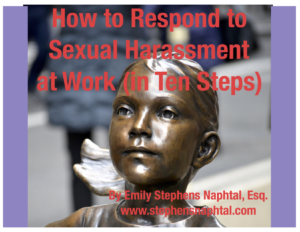Disability Accommodation Process in NYC
Do you have a disability? If so, you have a right to a reasonable disability accommodation in the workplace. Communication is an important part of crafting reasonable disability accommodations. In fact, NYC law requires this communication and calls it the “cooperative dialogue.” This post focuses this dialogue’s process.
New York Local Law No. 59 (2018) makes it unlawful for employers to fail to engage in a cooperative dialogue “with an individual who has requested an accommodation or who the covered entity has noticed may require such an accommodation.” See Local Law No. 59 § 1 2018; N.Y.C. Admin. Code § 8-102. The New York City Commission on Human Rights published guidance in April 2019 on this law. This guidance particularly addressed the process employees and employers must go through to find reasonable disability accommodations.
Initiating the Cooperative Dialogue
The cooperative dialogue begins when either:
(1) An employee informs her employer of her disability and requests an accommodation; or
(2) An employer has a reasonable basis to believe that the Employee has a disability that is affecting his work performance.
So basically this means that an employer must begin the cooperative dialogue with an employee even if the employee does not specifically reveal their disability and request an accommodation. The employer should not ask the employee directly if they have a disability but should rather open the conversation by asking the employee if there is anything going on that the employer can help with. The employer can mention that reasonable accommodations are available and direct the employee to its workplace policy. If the employee chooses not to disclose their disability or request an accommodation after this, then the employer has fulfilled its duty to initiate a cooperative dialogue. The employee may still initiate a cooperative dialogue at a later time.
The Cooperative Dialogue
The purpose of the cooperative dialogue is for the person with a disability to explain their individualized needs to their employer and for the employer to understand and explore ways in which they can meet those needs. A well functioning cooperative dialogue could be thought of as a team brainstorming effort with both the employee and employer engaged. Both the employer and employee must communicate in good faith. This means that an employee may not simply reject a reasonable accommodation that does meet his needs simply because it is not his preferred accommodation. This also means that an employer must continue to search for an accommodation if the employee rejects their first offers as not meeting their needs.
Overall, the NYC Commission on Human Rights will consider the following factors to determine if an employer engaged in a cooperative dialogue in good faith:
(1) whether the employer has a policy informing employees how to request accommodations based on disability;
(2) whether the employer responded in a timely manner in light of the urgency and reasonableness of the request; and
(3) whether the employer sought to obstruct or delay the cooperative dialogue or in any way intimidate or deter the individual from requesting the accommodation.
Concluding the Cooperative Dialogue for a Disability Accommodation
A cooperative dialogue ends when either:
(1) The employer offers the employee a reasonable accommodation which they accept. Then the employer grants the employee that reasonable accommodation.
(2) The employer determines that there is no accommodation available that will not cause undue hardship to the business.
(3) The employer offers the employee a reasonable accommodation which meets their needs but the employee does not accept it and no reasonable alternative was identified during the cooperative dialogue.
(4) No reasonable accommodation exists that will allow the employee to perform the essential requirements of the job.
Once the employer determines to offer an accommodation or that none can be made, it must inform the employee in writing of its determination. See Local Law No. 59 § 2 (2018); N.Y.C. Admin. Code § 8-107(28)(d). (“[u]pon reaching a final determination at the conclusion of a cooperative dialogue . . . the covered entity shall provide any person requesting an accommodation who participated in the cooperative dialogue with a final determination identifying an accommodation granted or denied.”).


